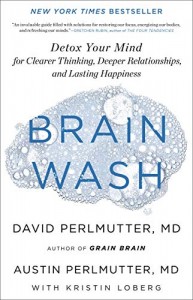Brain Wash: A Prescription for a Better Life


Contemporary life provides us with infinite opportunities, along with endless temptations. We can eat whatever we want, whenever we want. We can immerse ourselves in the vast, enticing world of digital media. We can buy goods and services for rapid delivery with our fingertips or voice commands. But living in this 24/7 hyper-reality poses serious risks to our physical and mental states, our connections to others, and even to the world at large.
 Brain Wash: Detox Your Mind for Clearer Thinking, Deeper Relationships, and Lasting Happiness by David Perlmutter, MD, and Austin Perlmutter, MD, builds from a simple premise: Our brains are being gravely manipulated, resulting in behaviors that leave us more lonely, anxious, depressed, distrustful, illness-prone, and overweight than ever before.
Brain Wash: Detox Your Mind for Clearer Thinking, Deeper Relationships, and Lasting Happiness by David Perlmutter, MD, and Austin Perlmutter, MD, builds from a simple premise: Our brains are being gravely manipulated, resulting in behaviors that leave us more lonely, anxious, depressed, distrustful, illness-prone, and overweight than ever before.
Based on the latest science, the book identifies the mental hijacking that undermines each of us, and presents the tools necessary to think more clearly, make better decisions, strengthen bonds with others, and develop healthier habits.
What sets this book apart from many like it is a reliance on data-backed statistics from clinical studies of all kinds. Guess how many selfies the average millennial may take over a lifetime? 25,700. (Millennials also show lower empathy levels than previous generations.)
Guess how much of your lifetime, assuming you’re an average American, you will spend looking at a screen? 22 years. Internet addiction affects a quarter of a billion people, or close to five times the population of England, but high-tech hijacking isn’t the only culprit. The foods we’ve been programmed to crave influence behavior and control gene expression, and you can’t readily get to the bottom of disconnection syndrome without discussing our increasing separation from the natural world, which the Perlmutter’s do.
Featuring a 10-day bootcamp program that includes the following steps:
 Day 1: Digital Interactions—The idea is not to completely cut technology out of your life, but to overhaul your use of digital devices. Cut out non-essential shopping, use airplane mode during dinner.
Day 1: Digital Interactions—The idea is not to completely cut technology out of your life, but to overhaul your use of digital devices. Cut out non-essential shopping, use airplane mode during dinner.
Day 2: Empathy—Reflecting on the positive aspects of your life and the people you care about is an exercise in mindfulness and empathy, and studies show that more gratitude means more empathy.
Day 3: Nature exposure—Spend at least 30 minutes in nature a day. Even in an urban environment, the benefits of nature can be enjoyed. A walk around the block to observe the landscape.
Day 4: Diet—Now is the time to take a good look at what you’ve been eating—and get rid of everything that is hurting your health. This is the moment to embrace the word no. Processed foods, sugar, ice cream.
Day 5: Sleep—Create a sleep sanctuary by making your room peaceful and quiet. Cut out all caffeine after 2 p.m. and establish a bedtime routine that tells your body it’s time for sleep.
 Day 6: Exercise—Be realistic about your starting point. The goal is sustainable movement. Plan how and when you exercise and have fun while doing it! Exercising with friends is a great way to keep all of you motivated.
Day 6: Exercise—Be realistic about your starting point. The goal is sustainable movement. Plan how and when you exercise and have fun while doing it! Exercising with friends is a great way to keep all of you motivated.
Day 7: Meditation—Expect your mind to be distracted while you meditate. That’s the whole idea! Catching your mind when it wanders is the goal, so don’t feel bad when you lose focus.
Day 8: Relationships—Spend ten minutes of unbroken time connecting with another person every day. It has to take place in person or video chat, and it has to entail conversation dedicated to learning something new about the other person.
Days 9 and 10: Evaluate your progress –How’s it going? You might feel like you’re just getting started, but now is the time to evaluate how the previous eight days went and where you want to go from here.